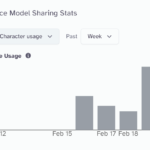Everywhere you turn in the personal finance niche, you hear that you should be putting 30% of your paycheck in the S&P 500 and waiting to be rich when you are older. There is nothing wrong with this advice, but did you ever stop to consider that the same logic could be applied elsewhere in your life?
Today I sat down and thought of the most meaningful examples to supercharge your 2024 goals.
Let’s start with the basics: What is compounding?
Einstein called compounding the “8th wonder of the world”, it is when your interest starts to earn interest, which in turn generates interest. Creating a snowball effect that, given enough time, can supercharge your wealth (or pretty much anything else you apply it to).
Here is a quick graph to illustrate the concept:

You will see the curve starts to go parabolic after about 25 years, but even equals the monthly contributions at 17 years. By year 40 the numbers are getting silly. For reference, this is $500 a month over 40 years at 8%. The effect is the same but varies depending on the rate of interest/increase that you receive.
You will also see the more time you give for something to grow, at a good rate of return, the quicker you will reach your goals.
This advice is popular among the investing community because it is so simple, and it’s true.
It’s not wrong, but it is not the only thing that compounds at this rate of return.
Whilst there is nothing wrong with the maths, people seem only to apply this logic to their money. Yes, it’s easier to see numbers stacking up, but there are other ways to use this 8th wonder of the world.
Below I have created a list of 5 things in your life that you can compound much faster than the stock market. For 2024, try and think of them in the same way as your money, and see if you can supercharge them.
- Skills. This can be almost anything. If you improve at any skill by 10% each year, you will find you are a heck of a lot better in 5–10 years in most instances. Why is Magnus Carlsen the best chess player in the world? Part of the reason is he started so young and has continued to improve ever since. Giving himself more time, combined with his brilliance has allowed him to compound his skill at Chess and his knowledge (which I will come to next). You can also increase your skills a lot faster than 10% a year, meaning your curve (Fig. 1) will have a much steeper/better trajectory.
- Knowledge. Similar to skills, knowledge compounds well. Following on from my Magnus Carlsen example, if you learn complex topics (in this case Chess) at an early age you can build up to the most complex topics before most people have even started to play chess. This gives you a much higher likelihood of crushing the competition.
- Health. Both positive and negative health habits can compound over time. Consistent healthy habits, like regular exercise and a balanced diet, can contribute to long-term well-being. Conversely, unhealthy habits can lead to long-term health issues. This applies to both Mental and Physical Health. If you want to run a marathon, you have to build up your fitness and increase your mileage each month. The same is true for many other areas of your mental and physical health.
- Networks. If you’ve heard of the flywheel effect then you will understand this. Nothing compounds quite like a network. Look at social media for example, how did Facebook grow so fast when it first started? It got people to invite all their friends, if each person invites 10 people, then you have a rate of 10x every time someone sends out a “join Facebook invite”. The same logic is applied to creating content now, the more people you are in front of regularly the more likely you are to bump into that person who could help you build something truly great. This one, like Health, must be used in the right way. Bad network effects will work against you just as fast.
- Reputation and Relationships. Similar to networks reputation (in business and life) can compound positively, or negatively over time. For relationships, it’s the shared experience and trust amongst other things that compound. For reputation, it is normally your touch points with your audience or customer that will build your reputation over time. For example in sales, it is often said that 8 touchpoints are needed before someone will buy from you. Brand power makes this easier, but you can see how reputation and relationships go hand in hand. You can also see why Warren Buffet places so much emphasis on brand power, these “moats” only get larger over time.
So the reasons seem pretty compelling, why will most fail to compound at the same rate as their money?
It’s simple. All the above are active compounding, you have to put the work in, and they all require one thing: consistency. We all know that’s the most difficult habit to acquire and maintain. But you can’t take your foot off the gas if you want to continue to improve in any of these aspects. Even the best relationship can not grow on love alone, it needs to be nurtured and worked on anew each day.
I hope you’ve enjoyed this article. It has got me thinking about a lot of my goals for the year, I want to ensure I focus on inputs rather than outputs this year. As, if we can compound at a better rate than the market, everything else will be very simple





